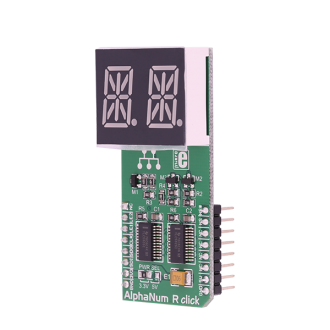
We strongly encourage users to use Package manager for sharing their code on Libstock website, because it boosts your efficiency and leaves the end user with no room for error. [more info]

Rating:
Author: MIKROE
Last Updated: 2018-07-03
Package Version: 1.0.0.0
mikroSDK Library: 1.0.0.0
Category: LED segment
Downloaded: 4728 times
Not followed.
License: MIT license
AlphaNum R click is a simple solution for adding 14-segment alphanumeric displays to your device. The board carries two TLC5926 16-bit Constant-Current LED sink Drivers as well as a dual character LED 14-segment display. The board is designed to use either a 3.3V or 5V power supply.
Do you want to subscribe in order to receive notifications regarding "AlphaNum R click" changes.
Do you want to unsubscribe in order to stop receiving notifications regarding "AlphaNum R click" changes.
Do you want to report abuse regarding "AlphaNum R click".
